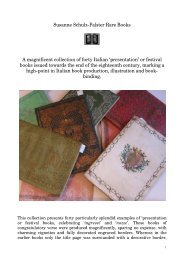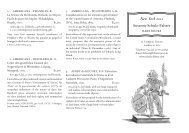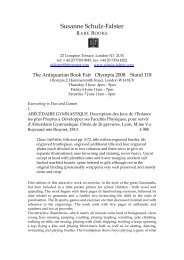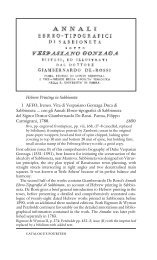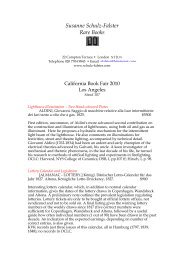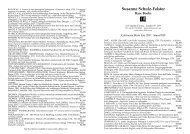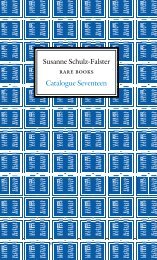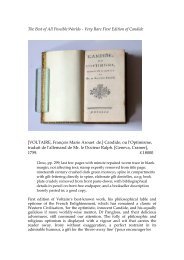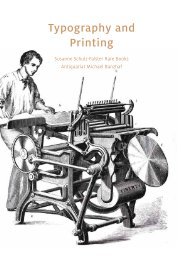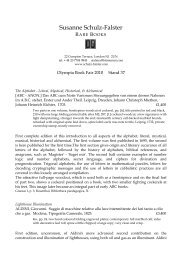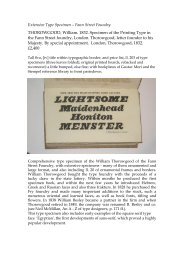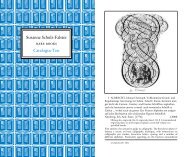Susanne Schulz-Falster Catalogue Eighteen - International League ...
Susanne Schulz-Falster Catalogue Eighteen - International League ...
Susanne Schulz-Falster Catalogue Eighteen - International League ...
You also want an ePaper? Increase the reach of your titles
YUMPU automatically turns print PDFs into web optimized ePapers that Google loves.
8vo, pp. [ii], 195, 5, with 80 copper engraved plates; clean tear to p.<br />
41, no loss; contemporary sheep, spine in compartments, ruled in gilt,<br />
sides with double gilt fillets; short tear at upper joint and head of spine<br />
chipped, a very clean and crisp copy, with a charming early ownership<br />
inscription to front free endpaper ‘William Akerman his book’, 1772.<br />
A fine copy of the English translation of Le Clerc’s well-known and influential<br />
geometry primer for artisans, painters, sculptors and architects, first<br />
published nearly a century earlier (1669). It attests both to the importance<br />
of his treatise and the charm of his illustrations that it was still being reprinted.<br />
The fine engravings each show a geometrical design placed within<br />
a charming landscape vignette or genre scene and are frequently cited as<br />
highlights of scientific illustrations. The originals were engraved by Le<br />
Clerc, the engravings for this English edition are reversed recuts.<br />
ESTC t174069.<br />
Nineteenth Century Book Thief<br />
70. LIBRI, Guillaume. Réponse de M. Libri au rapport de M.<br />
Boucly, publié dans le Moniteur universel, du 19 mars, 1848.<br />
London, <strong>Schulz</strong>e & Cie, 1848. £280<br />
susanne schulz-falster rare books catalogue eighteen<br />
8vo, pp. xii, 86; original printed wrappers, head of spine chipped and<br />
frayed; else a good copy.<br />
First London edition of Libri’s reply to a report made by Boucly, as Procureur<br />
du Roi, charging Libri with a long series of thefts from the Bibliothèque<br />
Nationale and other French libraries. The work was issued both in London<br />
and Paris and includes bibliographical references. Guglielmo Libri (1802–<br />
1869) was one of the most prolific book and manuscript thieves ever<br />
known. He used his connections and reputation as a scholar to gain access<br />
to France’s most valuable book collections, and in 1841 he was put in charge<br />
of making an inventory of the manuscript collections of France – a perfect<br />
opportunity for augmenting his own collection. The increasing size of his<br />
own library attracted the suspicion of fellow collectors, who questioned<br />
whether it could have been accumulated by legal means. By the late 1840s<br />
the authorities were alerted and he left for England, having arranged for his<br />
library of some 30,000 books and manuscripts to be shipped to England.<br />
St Bride catalogue p. 537; for a full account, see P. Alessandra Maccioni Ruju and<br />
Marco Mostert, The Life and Times of Guglielmo Libri, Scientist, Patriot, Scholar,<br />
Journalist, and Thief: A Nineteenth-century Story, 1995.<br />
The Dangers of the Literary Profession<br />
71. [LINGUET, Simon Nicolas Henri.] L’aveu sincère ou,<br />
Lettre a une mere sur les dangers que court la jeunesse en se livrant à<br />
un goût trop vif pour la littérature. Londres, et se trouve a Paris,<br />
L. Cellot, 1768. £850<br />
[bound after:] [Georg Ludwig Schmid d’Avenstein, Traités sur divers<br />
sujets intéressans de politique et de morale. Paris, [n.p.], 1760.<br />
Two works bound in one volume, 8vo, pp. 99; vi, [3], 10–254;<br />
attractively bound in contemporary sprinkled vellum, reusing a mss leaf,<br />
spine in compartments, gilt-lettered spine label; names of both authors<br />
added in manuscript; a fine copy.<br />
First edition of Linguet’s outspoken warning to parents, or mothers in<br />
particular, of the dangers of literature or the pursuit of literary life. Addressed<br />
in particular to his sister, and clearly based on his own experiences as a<br />
pamphleteer and provocative writer, he depicts the futility and pecuniary<br />
poverty of a life as a writer, and advises other aspiring authors to chose more<br />
lucrative and respectable professions. He describes the temptation of being<br />
lured by literary ambition and pride in elegant and well-turned phrases,<br />
but acknowledges that this only provides an illusion of social advance. He<br />
deplores the increasing commercialisation of literature.<br />
I. ESTC t188917; OCLC: Stanford, Cornell, Philadelphia, Cambridge, Oxford;<br />
II. INED 2907; II. Barbier IV, 814.



